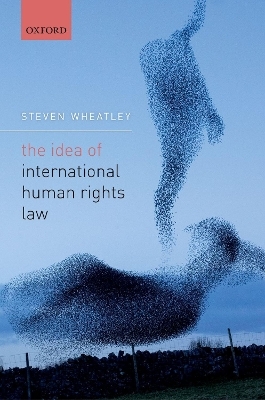
The Idea of International Human Rights Law
Seiten
2019
Oxford University Press (Verlag)
978-0-19-874984-4 (ISBN)
Oxford University Press (Verlag)
978-0-19-874984-4 (ISBN)
What is international human rights law? This question is addressed in this volume as Steven Wheatley explores how different types of human rights - moral, political, and legal - should be understood and considers how the complex systems theory of human rights can help to resolve current human rights controversies.
International human rights law has emerged as an academic subject in its own right, separate from, but still related to international law. This book explains the distinctive nature of this discipline by examining the influence of the idea of human rights on general international law. Rather than make use of a particular moral philosophy or political theory, it explains human rights by examining the way the term is deployed in legal practice, on the understanding that words are given meaning through their use. Relying on complexity theory to make sense of the legal practice of the United Nations, the core human rights treaties, and customary international law, the work demonstrates the emergence of the moral concept of human rights as a fact of the social world. It reveals the dynamic nature of this concept, and the influence of the idea on the legal practice, a fact that explains the fragmentation of international law and special nature of international human rights law.
International human rights law has emerged as an academic subject in its own right, separate from, but still related to international law. This book explains the distinctive nature of this discipline by examining the influence of the idea of human rights on general international law. Rather than make use of a particular moral philosophy or political theory, it explains human rights by examining the way the term is deployed in legal practice, on the understanding that words are given meaning through their use. Relying on complexity theory to make sense of the legal practice of the United Nations, the core human rights treaties, and customary international law, the work demonstrates the emergence of the moral concept of human rights as a fact of the social world. It reveals the dynamic nature of this concept, and the influence of the idea on the legal practice, a fact that explains the fragmentation of international law and special nature of international human rights law.
Steven Wheatley is Professor of International Law at the University of Lancaster. He has written extensively on the subject of human rights, including Democracy, Minorities and International Law (CUP, 2005) and The Democratic Legitimacy of International Law (Hart, 2010).
Introduction
1: What we Mean when we Talk about 'Human Rights'
2: Complexity as a Methodology in International Law
3: United Nations Human Rights Law
4: The Core UN Human Rights Treaty Systems
5: Customary Human Rights Law
6: On the Idea of Human Rights
7: The Idea of International Human Rights Law
| Erscheinungsdatum | 04.02.2019 |
|---|---|
| Verlagsort | Oxford |
| Sprache | englisch |
| Maße | 164 x 237 mm |
| Gewicht | 518 g |
| Themenwelt | Geschichte ► Teilgebiete der Geschichte ► Militärgeschichte |
| Recht / Steuern ► Allgemeines / Lexika | |
| Recht / Steuern ► EU / Internationales Recht | |
| Recht / Steuern ► Öffentliches Recht ► Völkerrecht | |
| Recht / Steuern ► Rechtsgeschichte | |
| ISBN-10 | 0-19-874984-8 / 0198749848 |
| ISBN-13 | 978-0-19-874984-4 / 9780198749844 |
| Zustand | Neuware |
| Haben Sie eine Frage zum Produkt? |
Mehr entdecken
aus dem Bereich
aus dem Bereich
neueste Manipulationstechniken als Waffengattung der NATO
Buch | Softcover (2023)
Westend (Verlag)
CHF 33,55
Deutschlands Schwäche in der Zeitenwende
Buch | Softcover (2023)
C.H.Beck (Verlag)
CHF 25,20


